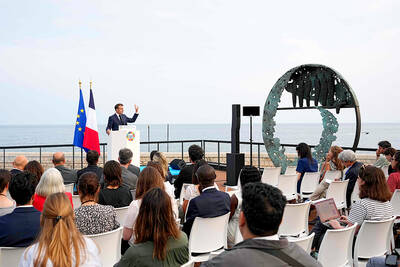A large scientific study into the biological basis of sexual behavior has confirmed that there is no single “gay gene,” but that a complex mix of genetics and environmental factors affects whether a person has same-sex sexual partners.
The research, which analyzed data on DNA and sexual experiences from almost half a million people, found that there are thousands of genetic variants linked to same-sex sexual behavior, most with very small effects. Five of the genetic markers were “significantly” associated with same-sex behavior, the researchers said, but even these are far from being predictive of a person’s sexual preferences.
“We scanned the entire human genome and found a handful — five to be precise — of locations that are clearly associated with whether a person reports engaging in same-sex sexual behavior,” said Andrea Ganna, a biologist at the Institute of Molecular Medicine in Finland who co-led the research. He said these have “a very small effect” and, combined, explain “considerably less than 1 percent of the variance in the self-reported same-sex sexual behavior.”

Photo: Reuters
照片:路透
This means that non-genetic factors — such as environment, upbringing, personality, nurture — are far more significant in influencing a person’s choice of sexual partner, just as with most other personality, behavioral and physical human traits, the researchers said.
The study — the largest of its kind — analyzed survey responses and performed analyses known as genome-wide association studies (GWAS) on data from more than 470,000 people who had given DNA samples and lifestyle information to the UK Biobank and to a US genetics testing company.
Asked why they had wanted to conduct such research, the team told reporters on a teleconference that previous studies on this topic had mostly been too small to offer robust conclusions. “Previous studies were small and underpowered,” Ganna said. “So we decided to form a large international consortium and collected data for [almost] 500,000 people, [which] is approximately 100 times bigger than previous studies on this topic.”
The results, published in the journal Science on Aug. 29, found no clear patterns among genetic variants that could be used to meaningfully predict or identify a person’s sexual behavior, the researchers said. “We’ve clarified that there’s a lot of diversity out there,” said Benjamin Neale, a member at the Broad Institute of MIT and Harvard who worked with Ganna. “This moves our understanding [of same-sex sex] to a deeper and more nuanced place.”
Sexual rights campaigners welcomed the study, saying it “provides even more evidence that being gay or lesbian is a natural part of human life.” “This new research also re-confirms the long established understanding that there is no conclusive degree to which nature or nurture influences how a gay or lesbian person behaves,” said Zeke Stokes of the US-based LGBTQ rights group GLAAD.
(Reuters)
近期一份大型的科學研究深入探討人類性行為的生物學根據,結果證實單一的「同志基因」並不存在,一個人是否有同性性伴侶其實是複雜的遺傳學與環境交互影響的結果。
這份研究分析了將近五十萬人的DNA資訊與性經驗,結果發現跟同性性行為有關連的基因變異多達數千種,但絕大多數的影響都相當有限。研究人員表示,有五種基因標記和同性性行為「顯著」相關,但儘管如此,這些標記仍遠不能預測一個人的性傾向。
芬蘭分子醫學研究所的生物學家安德烈亞‧根納是這項研究的共同作者,他表示:「我們掃描了整個人類基因組,並且發現幾個──精確來說,應該是五處──基因體位置,與受試者回報他們和同性發生性行為與否明顯相關。但是根納指出這些基因體「影響非常小」,合併起來只能解釋「在自己回報為同性性行為者的群體中,具有這種變異的人遠少於百分之一。」
研究人員指出,這意味著非遺傳因素──例如環境、教養方式、個性、後天養育──對於一個人選擇性伴侶的影響更為顯著,影響程度相似於其他大多數人格特質、人類行為以及身體特徵。
這份研究是同類型研究中最大規模的一次,超過四十七萬人將他們的DNA樣本和生活方式相關資訊,交給英國的「人體生物資料庫」和美國一間基因檢測公司,研究人員再分析問卷調查結果,並且對受試者提供的資料進行「全基因組關聯分析」。
被問到為什麼想要進行這類研究時,研究團隊在電話會議中告訴記者,他們認為關於這個主題的前行研究大多規模太小,以至於無法提供強而有力的結論。根納表示:「之前的研究都是小規模,統計檢定力也不足。因此,我們決定組成一個大型的國際協作關係,從中收集到(將近)五十萬人的資料,規模大概是相同主題前行研究的一百倍。」
這篇研究的結果在八月二十九日刊登於期刊《科學》,研究人員指出,他們並未在基因變異中發現明顯的模式,可用來有效預測或鑑定一個人的性行為。與根納合作的麻省理工學院─哈佛大學布洛德研究所成員班傑明‧尼勒表示:「我們可以確知的是,這些因素是非常多元的。這讓我們(對於同性戀)的理解能夠更深入、更細緻。」
性權利倡議者對這份研究表示肯定,認為它「提供更多證據,顯示身為男同性戀或是女同性戀其實是人類生活中自然的一部分。」美國LGBTQ權利倡議團體「同性戀者反詆毀聯盟」的柴克‧史托克斯表示:「這項新研究也再次確認長久以來確立的認知,也就是自然或是後天養育,對於男同性戀或是女同性戀如何表現自己,都沒有決定性的影響程度。」
(台北時報章厚明譯)

William I of Prussia, a passionate painter, often autographed his works with “tormentis pinxit” — “painted in pain” — as a nod to his struggles with gout. Other historical figures like King Henry VIII of England and Benjamin Franklin also suffered from this “disease of kings,” which was common among people indulging in luxurious diets. Gout is primarily caused by high levels of uric acid in the body. Uric acid forms as the body breaks down purines, which are found in foods like red meat and seafood. Normally, the kidneys filter out uric acid. However, if the body produces

The UN Ocean Conference wrapped up in Nice, France on Friday last week with world leaders taking major steps toward marine protection and vowing a showdown when nations meet to negotiate rules for deep-sea mining next month. But a lack of funding pledges and the total omission of fossil fuels disappointed some observers. The summit was just the third — and largest yet — dedicated entirely to what the United Nations calls an “emergency” in the world’s oceans. The High Seas Treaty, or Global Ocean Treaty, is also known as the Agreement under the United Nations Convention on the Law

A: The National Palace Museum (NPM) has launched an exhibition, titled “From Impressionism to Early Modernism.” There are 81 masterpieces from the Metropolitan Museum of Art on display now. B: The exhibit, held to celebrate the NPM’s centennial, must be so spectacular. A: It includes artworks by 38 artists, such as Renoir, van Gogh, Cezanne, Matisse and Gauguin. B: The Fubon Art Museum has also launched an exhibit featuring a number of artworks of Impressionism, including Monet’s “Water Lilies.” A: And the New Taipei City Art Museum just had its grand opening, so there are even more exhibitions

1. 他昨天告訴我們,他已經寫完了他的第一本書。 ˇ He told us yesterday that he had finished writing his first book. ˇ Yesterday he told us that he had finished writing his first book. χ He told us that he had finished writing his first book yesterday. 註︰一般而言,時間副詞應放在句末,但誤句 yesterday 放在句末,會使人誤以為 yesterday 修飾從屬句中的 had finished,與原意不合,因此 yesterday 宜放在中間或句首。 2. 從他的談吐中,我們可以看出他是有教養的人。 ˇ We can tell from his speech that he is a well-educated man. ˇ From his speech we can tell that he is a well-educated man. χ We can tell that he is a well-educated man from his speech. 註︰第三句不算錯,但 from his speech 放在句末,易使人誤解為修飾從屬句中的動詞,最好放在句首或主句動詞之後。 3. 消息傳來,我們的人員受困沙漠。 ˇ The news came that our men were stranded in a desert. χ The